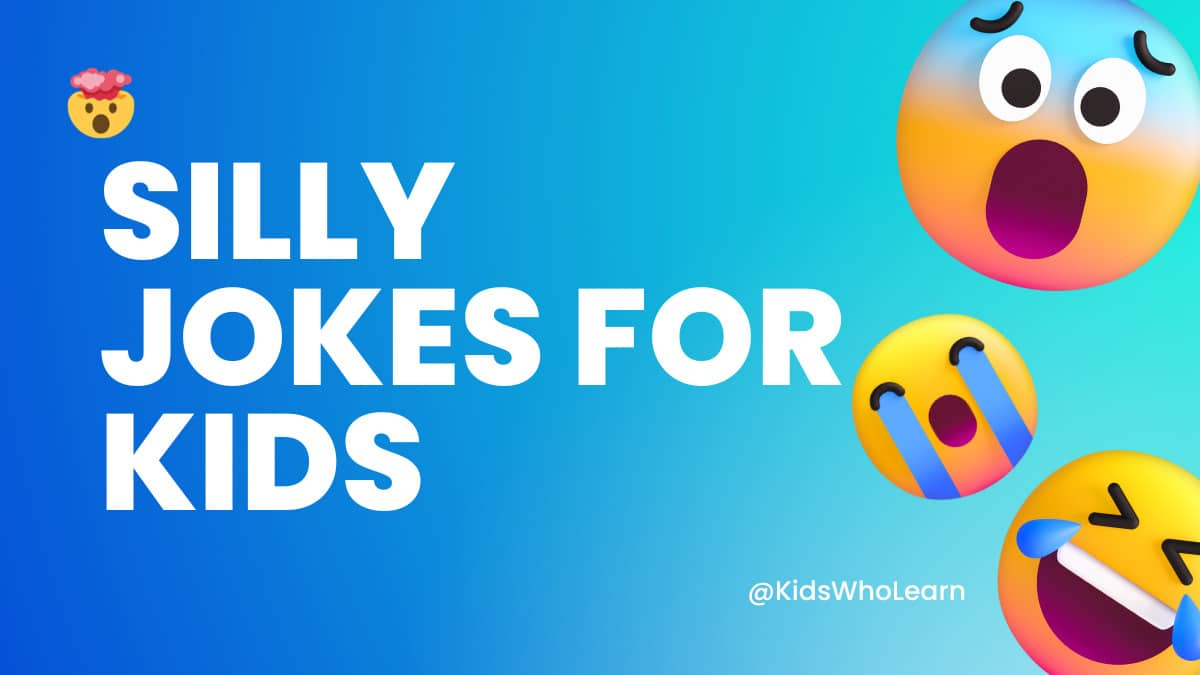Looking for a way to keep your kids entertained and laughing? Look no further than silly jokes! Silly jokes are a great way to get kids giggling and having fun. Whether they’re told in the car, around the dinner table, or just for fun, silly jokes are a great way to bring a smile to your child’s face.
Silly jokes come in all shapes and sizes. From knock-knock jokes to puns, there’s a silly joke out there for everyone. Silly jokes are a great way to get kids thinking creatively and using their imaginations. They can also help kids develop a sense of humor and learn to appreciate the lighter side of life. Whether you’re looking for a way to bond with your child or just looking for a way to keep them entertained, silly jokes are a great choice.
Understanding Humor in Kids
Humor is an essential part of a child’s life. It can help them build relationships, cope with stress, and develop a positive attitude. Understanding humor in kids is crucial to support their social and emotional development. In this section, we will discuss the development of humor and the importance of laughter in children’s lives.
Development of Humor
The development of humor in children is a complex process that begins in infancy. Babies as young as six months old can recognize when something is funny and respond with laughter. As they grow older, children start to understand the concept of jokes and puns. They also learn to appreciate different types of humor, such as slapstick, wordplay, and irony.
Research suggests that children’s sense of humor develops in stages. Here are the three stages of humor development in children:
| Stage | Age | Characteristics |
|---|---|---|
| Pre-school | 3-4 years | Enjoy simple jokes and physical humor |
| Elementary | 5-7 years | Appreciate wordplay and riddles |
| Middle School | 8-12 years | Understand sarcasm and irony |
Importance of Laughter
Laughter is a natural response to humor and an essential part of a child’s life. It has many benefits, both physical and emotional. Here are some of the benefits of laughter in children:
- Reduces stress and anxiety
- Boosts the immune system
- Improves mood and self-esteem
- Enhances social skills and relationships
Encouraging laughter in children can be as simple as telling silly jokes or playing fun games. You can also create a positive and humorous environment at home or in the classroom by using humor to diffuse tense situations and promote a sense of playfulness.
In conclusion, understanding humor in kids is vital to support their social and emotional development. By recognizing the stages of humor development and the importance of laughter, you can help children develop a healthy sense of humor that will benefit them throughout their lives.
Types of Silly Jokes for Kids
If you’re looking for some silly jokes for kids, there are several types to choose from. Here are some of the most popular types of silly jokes for kids.
Knock Knock Jokes
Knock knock jokes are a classic type of silly joke that kids love. They usually involve a back-and-forth between two people, with each person saying a line. Here’s an example:
Knock, knock.
Who’s there?
Boo.
Boo who?
Don’t cry, it’s just a joke!
Riddles
Riddles are another type of silly joke that kids enjoy. They usually involve a question or statement that has a clever or unexpected answer. Here’s an example:
What has a head and a tail but no body?
A coin!
Puns
Puns are jokes that play on words that sound the same but have different meanings. Kids love puns because they’re often silly and easy to understand. Here’s an example:
Why did the tomato turn red?
Because it saw the salad dressing!
Funny Stories
Finally, funny stories are a great way to make kids laugh. These stories usually involve a silly or absurd situation that’s sure to get a chuckle. Here’s an example:
Once there was a cow who could only say “moo.” One day, she met a duck who could only say “quack.” They became friends and decided to go on an adventure together. As they were walking, they came across a farmer who asked the cow, “What’s your name?” The cow replied, “Moo.” The farmer asked the duck, “And what’s your name?” The duck replied, “Moo too!”
Creating Silly Jokes for Kids
If you want to make your kids laugh, creating silly jokes is a great way to do it. Here are some tips on how to create silly jokes that will have your kids giggling for hours.
Using Everyday Situations
One of the easiest ways to create silly jokes for kids is to use everyday situations. For example, you could make a joke about brushing teeth or going to bed. Here are some examples:
- Why did the toothbrush go to bed? Because it was tired of cleaning teeth all day!
- Why did the pillow go to the dentist? To get its filling!
By using situations that kids can relate to, you can create jokes that are both silly and easy to understand.
Incorporating Kids’ Interests
Another way to create silly jokes for kids is to incorporate their interests. If your child loves animals, for example, you could make a joke about a talking animal. Here are some examples:
- Why did the chicken cross the playground? To get to the other slide!
- What do you get when you cross a snowman and a shark? Frostbite!
By incorporating your child’s interests into the joke, you can create something that is both silly and personalized to their tastes.
Remember, creating silly jokes for kids is all about having fun. So don’t be afraid to be silly and let your imagination run wild!
Tips for Delivering Jokes
When it comes to delivering silly jokes to kids, there are a few things you can do to make sure your delivery is on point. Follow these tips to ensure your jokes land with maximum impact.
Timing
Timing is everything when it comes to delivering a joke. You want to make sure you deliver the punchline at just the right moment to maximize its impact. Here are a few tips for getting your timing right:
- Pause before the punchline to build anticipation.
- Don’t rush through the setup – take your time to build up to the punchline.
- Wait for the laughter to die down before moving on to the next joke.
Expression
Your facial expressions and body language can also play a big role in delivering a joke. Here are a few things to keep in mind:
- Use exaggerated facial expressions to emphasize the punchline.
- Use gestures to add emphasis and help illustrate the joke.
- Maintain eye contact with your audience to keep them engaged.
Repetition
Repetition can be a powerful tool when it comes to delivering jokes. Here are a few ways you can use repetition to your advantage:
- Repeat key words or phrases to build anticipation.
- Use callbacks to earlier jokes to create a sense of continuity.
- Repeat a joke with a slight variation to keep things fresh.
By following these tips, you can become a pro at delivering silly jokes to kids. Remember, practice makes perfect – so don’t be afraid to experiment and find what works best for you!
Benefits of Silly Jokes for Kids
Silly jokes are not just a source of entertainment for kids, but they also offer several benefits that can help in their overall growth and development. Here are some of the benefits of silly jokes for kids:
Boosting Confidence
Silly jokes can help boost a child’s confidence by making them feel good about themselves. When a child tells a joke and receives a positive response from their peers, it can make them feel proud and confident. This can encourage them to speak up more often and participate in social situations with greater ease.
Enhancing Creativity
Silly jokes can also help enhance a child’s creativity by encouraging them to think outside the box. When children are exposed to different types of jokes, they start to think about things in a different way. This can help them develop their imagination and come up with new ideas.
Improving Social Skills
Silly jokes can help improve a child’s social skills by providing them with a way to connect with others. When children tell jokes, they are engaging in a form of communication that can help them build relationships with their peers. This can help them develop their social skills and learn how to interact with others in a positive way.
Overall, silly jokes can be a fun and beneficial way to help kids grow and develop. By boosting their confidence, enhancing their creativity, and improving their social skills, silly jokes can provide kids with a range of benefits that can help them succeed in life.
Conclusion
In this article, you have learned about some silly jokes that are perfect for kids. These jokes are easy to understand and will surely make your child laugh. Remember that laughter is important for children’s mental and emotional well-being, so it is a good idea to incorporate humor into their daily lives.
By telling your child these jokes, you are not only providing them with entertainment but also helping them develop their sense of humor and creativity. Encourage your child to come up with their own silly jokes and share them with their friends and family.
It is important to note that while these jokes are meant to be silly and light-hearted, it is crucial to teach children the importance of being respectful and not using humor to hurt or belittle others. Make sure to have conversations with your child about what is appropriate and what is not.
Overall, silly jokes are a fun and harmless way to bring joy and laughter into your child’s life. So go ahead and share these jokes with your child and watch as their faces light up with laughter.







